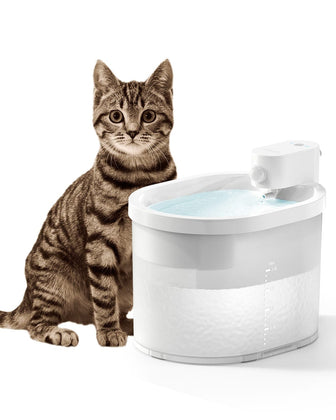Cats have been domesticated for thousands of years and have become one of the most popular pets in the world. They are beloved for their playful personalities, affectionate nature, and their ability to provide comfort and companionship. One of the most common questions asked by cat owners is how long their furry friend will live.
The lifespan of a cat can vary greatly depending on various factors such as breed, genetics, and lifestyle. On average, cats can live anywhere from 12 to 20 years, with some living well into their 20s. However, some cats may have a shorter lifespan due to health issues or accidents. Understanding the factors that affect a cat's lifespan can help owners provide the best care possible to ensure their cat lives a long and healthy life.
How Long Do Cats Live? A Guide to Feline Lifespan
Key Takeaways
Cats can live anywhere from 12 to 20 years on average, but some may live well into their 20s.
The lifespan of a cat can be affected by various factors such as breed, genetics, and lifestyle.
Understanding the factors that affect a cat's lifespan can help owners provide the best care possible to ensure their cat lives a long and healthy life.
Average Lifespan of Cats
Cats are popular pets and can live for many years. The average lifespan of cats varies depending on several factors such as breed, lifestyle, and overall health. In this section, we will explore the average lifespan of cats and some of the factors that can affect their longevity.

Domestic Cats Average Lifespan
Domestic cats, which are cats that live indoors with their owners, have an average lifespan of 12-16 years. However, some cats can live well into their 20s with proper care and attention. Domestic cats that are well-fed, receive regular veterinary care, and live in a stress-free environment tend to live longer than cats that are neglected or exposed to stressors.
Indoor vs Outdoor Cats Lifespan
Indoor cats tend to live longer than outdoor cats due to the reduced risk of injury and exposure to diseases. Outdoor cats are more likely to be hit by a car, attacked by other animals, or contract diseases from other cats. On average, outdoor cats have a lifespan of 2-5 years, while indoor cats can live up to 20 years or more.
Breed-Specific Lifespan Variations
Different cat breeds have varying lifespans, with some breeds living longer than others. For example, Siamese cats have an average lifespan of 15-20 years, while Persian cats have an average lifespan of 10-15 years. Some breeds may be more prone to certain health conditions that can affect their lifespan, such as heart disease or kidney problems.
In conclusion, the average lifespan of cats can vary depending on several factors such as breed, lifestyle, and overall health. By providing proper care and attention, cat owners can help ensure their furry friends live long and healthy lives.
Factors Affecting Cat Lifespan
Cats are known for their longevity, and with proper care and attention, they can live well into their late teens or even early twenties. However, there are several factors that can impact a cat's lifespan, including genetics, nutrition, veterinary care, exercise, and mental stimulation.
Genetic Impact
Genetics play a significant role in a cat's lifespan, and certain breeds are more prone to certain health issues that can impact their longevity. For example, Siamese cats are more likely to develop respiratory issues, while Persian cats are prone to kidney disease. It is essential to research a breed's health history before adopting a cat to ensure that you can provide the necessary care.
Nutrition and Diet
A cat's diet can also impact their lifespan, and a balanced diet is essential for their overall health and wellbeing. A diet that is high in protein and low in carbohydrates is ideal for cats, and it is important to avoid feeding them human food or food that is high in fat.
Providing fresh water and investing in a cat water fountain can also help ensure that your cat stays hydrated and healthy.

Veterinary Care and Vaccinations
Regular veterinary care and vaccinations are crucial for a cat's health and can help prevent the onset of certain diseases. It is recommended that cats receive annual checkups and vaccinations, and it is important to address any health concerns as soon as they arise. Early detection and treatment can significantly impact a cat's lifespan.
Exercise and Mental Stimulation
Exercise and mental stimulation are essential for a cat's overall health and wellbeing. Providing toys and scratching posts can help keep them mentally stimulated, while regular playtime and exercise can help prevent obesity and other health issues. It is important to provide a safe and stimulating environment for your cat to help them thrive.
Related Posts:
Common Health Issues and Their Impact
Cats are susceptible to various health issues that can affect their lifespan. It is essential to be aware of these issues and take preventive measures to ensure your feline friend lives a long and healthy life.
Health Issues Affecting Lifespan
One of the most common health issues affecting cats is dental disease. Poor dental health can lead to infections, abscesses, and even organ damage. Other health issues that can impact a cat's lifespan include kidney disease, cancer, and obesity. Regular veterinary check-ups and preventative care can help detect and treat these issues early on.
Early Detection and Treatment
Early detection and treatment are crucial in ensuring a cat's health. Regular veterinary check-ups can help detect any health issues early on, allowing for prompt treatment and management. It is also essential to keep an eye out for any changes in behavior or appetite, as these can be signs of underlying health issues.
Spaying/Neutering Benefits
Spaying or neutering your cat can have numerous health benefits. It can prevent certain cancers and infections and reduce the risk of behavioral issues such as spraying and aggression. It is also essential in controlling the cat population and reducing the number of homeless cats.
Related Posts:
Conclusion
In conclusion, cats have a relatively long lifespan compared to other domesticated animals. With proper care and attention, a cat can live up to 20 years or more. However, it is important to note that individual factors such as genetics, environment, and lifestyle can all play a role in determining a cat's lifespan.
Owners can help their cats live longer by providing them with a balanced diet, regular exercise, and routine veterinary care. It is also important to keep cats indoors to protect them from potential hazards such as traffic accidents, fights with other animals, and exposure to diseases.
In summary, while there is no guaranteed lifespan for any cat, owners can take steps to help their feline companions live long and healthy lives. By providing them with love, care, and attention, cats can bring joy and companionship to their owners for many years to come.

Frequently Asked Questions
What is the average lifespan of an indoor cat?
Indoor cats typically live longer than outdoor cats, with an average lifespan of 12-16 years. However, some indoor cats can live well into their 20s with proper care and attention.
At what age is a cat considered senior or geriatric?
Cats are generally considered senior at around 7-10 years of age and geriatric at around 15 years of age. However, this can vary depending on the breed and individual health of the cat.
What factors influence the lifespan of a cat?
Several factors can influence a cat's lifespan, including genetics, diet, exercise, and overall health. Regular veterinary check-ups and preventative care can also play a significant role in a cat's longevity.
How does living indoors vs. outdoors affect a cat's longevity?
Indoor cats tend to live longer than outdoor cats due to the reduced risk of accidents, exposure to diseases, and other environmental hazards. Outdoor cats may have a shorter lifespan due to these factors, but with proper care and attention, they can still live long and healthy lives.
Can cats reach 20 years of age, and if so, how common is it?
Yes, cats can live to be 20 years of age or older. While it is less common for cats to reach this age, it is becoming more common with advances in veterinary care and nutrition.
What are the life expectancy differences between various cat breeds?
Life expectancy can vary widely between different cat breeds. Some breeds, such as the Siamese and Persian, tend to live longer than others. However, individual health and care can also play a significant role in a cat's lifespan, regardless of breed.

















